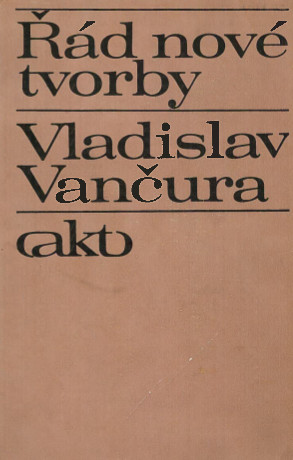Vladislav Vančura: Řád nové tvorby (1972) [Czech]
Filed under book | Tags: · architecture, art criticism, art theory, avant-garde, cultural criticism, film criticism, linguistics, literary criticism, literature, theatre

Souborné vydání statí, přednášek, referátů, lektorských posudků a glos o literatuře, filmu, výtvarném umění Vladislava Vančury.
Edited by Milan Blahynka a Štěpán Vlašín
Publisher Svoboda, Prague, 1972
635 pages
via Ústav pro českou literaturu AV ČR
Vančura at Wikipedia (Czech)
Comment (0)Walter Benjamin: The Arcades Project (1982/1999) [German, English]
Filed under book | Tags: · 1800s, advertising, bourgeoisie, city, commodification, critical theory, cultural criticism, fashion, flaneur, history, literary criticism, literature, paris, photography, poetry

“To great writers,” Walter Benjamin once wrote, “finished works weigh lighter than those fragments on which they labor their entire lives.” Conceived in Paris in 1927 and still in progress when Benjamin fled the Occupation in 1940, The Arcades Project is a monumental ruin, meticulously constructed over the course of thirteen years—“the theater,” as Benjamin called it, “of all my struggles and all my ideas.”
Focusing on the arcades of nineteenth-century Paris—glass-roofed rows of shops that were early centers of consumerism—Benjamin presents a montage of quotations from, and reflections on, hundreds of published sources, arranging them in 36 categories with descriptive rubrics such as “Fashion,” “Boredom,” “Dream City,” “Photography,” “Catacombs,” “Advertising,” “Prostitution,” “Baudelaire,” and “Theory of Progress.” His central preoccupation is what he calls the commodification of things—a process in which he locates the decisive shift to the modern age.
The Arcades Project is Benjamin’s effort to represent and to critique the bourgeois experience of nineteenth-century history, and, in so doing, to liberate the suppressed “true history” that underlay the ideological mask. In the bustling, cluttered arcades, street and interior merge and historical time is broken up into kaleidoscopic distractions and displays of ephemera. Here, at a distance from what is normally meant by “progress,” Benjamin finds the lost time(s) embedded in the spaces of things.
German edition: Gesammelte Schriften, Bd 5: Das Passagen-Werk
Edited by Rolf Tiedemann
Publisher Suhrkamp Verlag, Frankfurt am Main, 1982
ISBN 3518285351
1354 pages
English edition
Translated by Howard Eiland and Kevin McLaughlin
Publisher The Belknap Press of Harvard University Press, Cambridge/MA and London, 1999
ISBN 067404326X, 9780674043268
1073 pages
Das Passagen Werk (German)
The Arcades Project (English)
See also Susan Buck-Morss’ The Dialectics of Seeing: Walter Benjamin and the Arcades Project (1989), and Benjamin at Monoskop (incl. source bibliography).
Comment (1)Siegfried Kracauer: The Mass Ornament: Weimar Essays (1963/1995)
Filed under book | Tags: · 1920s, 1930s, cinema, cultural criticism, cultural politics, dance, everyday, film theory, germany, literature, photography, weimar republic

“Siegfried Kracauer was one of the twentieth century’s most brilliant cultural critics, a daring and prolific scholar, and an incisive theorist of film. In this volume his finest writings on modern society make their long-awaited appearance in English.
This book is a celebration of the masses–their tastes, amusements, and everyday lives. Taking up themes of modernity, such as isolation and alienation, urban culture, and the relation between the group and the individual, Kracauer explores a kaleidoscope of topics: shopping arcades, the cinema, bestsellers and their readers, photography, dance, hotel lobbies, Kafka, the Bible, and boredom. For Kracauer, the most revelatory facets of modern life in the West lie on the surface, in the ephemeral and the marginal. Of special fascination to him is the United States, where he eventually settled after fleeing Germany and whose culture he sees as defined almost exclusively by “the ostentatious display of surface.”
With these essays, written in the 1920s and early 1930s and edited by the author in 1963, Kracauer was the first to demonstrate that studying the everyday world of the masses can bring great rewards. The Mass Ornament today remains a refreshing tribute to popular culture, and its impressively interdisciplinary essays continue to shed light not only on Kracauer’s later work but also on the ideas of the Frankfurt School, the genealogy of film theory and cultural studies, Weimar cultural politics, and, not least, the exigencies of intellectual exile.
In his introduction, Thomas Levin situates Kracauer in a turbulent age, illuminates the forces that influenced him–including his friendships with Walter Benjamin, Theodor Adorno, and other Weimar intellectuals–and provides the context necessary for understanding his ideas. Until now, Kracauer has been known primarily for his writings on the cinema. This volume brings us the full scope of his gifts as one of the most wide-ranging and penetrating interpreters of modern life.”
Originally published in German as Das Ornament der Masse: Essays, Suhrkamp Verlag, 1963
Translated, Edited, and with an Introduction by Thomas Y. Levin
Publisher Harvard University Press, 1995
ISBN 0674551621
416 pages

